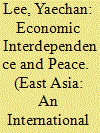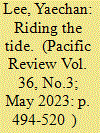| Srl | Item |
| 1 |
ID:
162647


|
|
|
|
|
| Summary/Abstract |
Liberalists have argued that increased economic interdependence will deter the likelihood of war as opportunity costs of a military conflict will not be fashionable for either side. Realists such as Waltz contended that while interdependence promotes peace to a certain extent, it also multiplies the occasions for conflicts. Dale Copeland drew perspectives from both sides to argue that interdependence may lead to peace depending on the expectations of the future trade environment. Now, with the United States’ (US) ongoing trade war with China and its legacy of trade conflicts with Japan in the 1990s, the question of whether economic interdependence brings peace deserves to be revisited. This article, through making a comparison between the cases of bilateral trade conflicts between the US and China and the US and Japan, contends that increased bilateral economic interdependence also increased the frequency of conflicts in the two respective cases. Moreover, it further argues that such increase in frequency was due to the US’s negative expectations on the future trade environment.
|
|
|
|
|
|
|
|
|
|
|
|
|
|
|
|
| 2 |
ID:
192538


|
|
|
|
|
| Summary/Abstract |
This article examines how South Korea has used the ASEAN Plus security platforms to hedge between the US and China and why it has not participated in the FOIP strategy. It argues that the platforms’ neutral guise, owing to ASEAN centrality and their global norms-based agenda has allowed Korea to passively voice its alignment with the US, thereby answering to the pressure for a higher commitment from the US and clearing the political risk of linking the alignment decision to its own views. It asserts, therefore, that access to effective multilateral security platforms allows higher leverage to the weaker ally in an asymmetric alliance relationship.
|
|
|
|
|
|
|
|
|
|
|
|
|
|
|
|